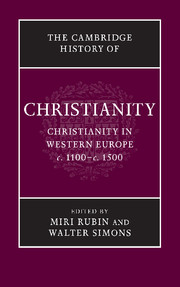Book contents
- Frontmatter
- Introduction
- PART I INSTITUTIONS AND CHANGE: 1100–1200
- PART II FORGING A CHRISTIAN WORLD, 1200–1300
- PART III THE ERECTION OF BOUNDARIES
- 10 Christians and Jews
- 11 Christendom and Islam
- 12 Christians and heretics
- 13 Women and men
- 14 Heaven, hell and purgatory: 1100–1500
- PART IV SHAPES OF A CHRISTIAN WORLD
- PART V CHRISTIAN LIFE IN MOVEMENT
- PART VI THE CHALLENGES TO A CHRISTIAN SOCIETY
- PART VII REFORM AND RENEWAL
- Select bibliography
- Index
- Map 1 Western Europe c. 1100 – c. 1500
- Map 2 Universities of Europe
- References
11 - Christendom and Islam
from PART III - THE ERECTION OF BOUNDARIES
Published online by Cambridge University Press: 28 March 2010
- Frontmatter
- Introduction
- PART I INSTITUTIONS AND CHANGE: 1100–1200
- PART II FORGING A CHRISTIAN WORLD, 1200–1300
- PART III THE ERECTION OF BOUNDARIES
- 10 Christians and Jews
- 11 Christendom and Islam
- 12 Christians and heretics
- 13 Women and men
- 14 Heaven, hell and purgatory: 1100–1500
- PART IV SHAPES OF A CHRISTIAN WORLD
- PART V CHRISTIAN LIFE IN MOVEMENT
- PART VI THE CHALLENGES TO A CHRISTIAN SOCIETY
- PART VII REFORM AND RENEWAL
- Select bibliography
- Index
- Map 1 Western Europe c. 1100 – c. 1500
- Map 2 Universities of Europe
- References
Summary
Given the great variety of Christian and Muslim cultures in the Middle Ages, it should not be surprising that relations between the two defy synthesis. The relationships to Islam of the many Christians who lived in Muslim lands, for example, were very different from those of Christians living in orthodox Christian Byzantium or Catholic Latin Europe. The word ‘Christendom’ in the title therefore reflects a sharp but necessary abridgement of the topic. This article will focus only on those lands that came to think of themselves as ‘Christendom’: that is, Catholic Western Europe, from the Iberian to the Hungarian kingdoms. It will ask three interrelated questions. First, what did Christians know about Islam? Second, how did their thinking about Islam affect the formation of the concept of Christendom itself? And third, how did Islam experience Christendom? For throughout our period there were not only numerous Christian incursions into the lands of Islam (via pilgrimage, trade, crusade and mission), but also many Muslims living within Christendom.
The first two questions, of course, are quite different from the third, for they have less to do with the study of historical contacts and relations between Christianity and Islam in the Middle Ages, and more to do with the study of the role that Christian ideas about Islam play in the formation of Christian conceptualisations of the world and Christianity’s place in it. The third question, on the other hand, is about historically specific encounters between Christians and Muslims.
Keywords
- Type
- Chapter
- Information
- The Cambridge History of Christianity , pp. 149 - 169Publisher: Cambridge University PressPrint publication year: 2009
References
- 3
- Cited by

